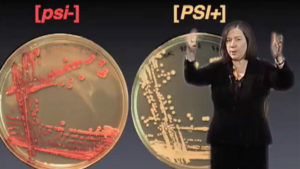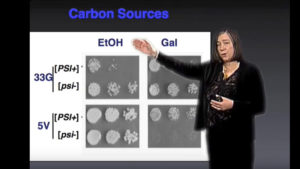Talk Overview
What do “mad cows”, people with neurodegenerative diseases and yeast cells growing happily on a deadly antibiotic have in common? They are all experiencing the consequences of misfolded proteins. Each organism has thousands of different proteins, which define its nature. Like origami paper, they can take the right path and fold into a swan or take the wrong path and fold into a rapacious hawk. The consequences can be deadly, leading to devastating neurodegenerative diseases in humans. Remarkably, a very similar folding process has been discovered in yeast, where it does no harm and can be studied easily and inexpensively.
Part II: In the case of the yeast prion [PSI], the misfolding of the Sup35 protein results in a simple change in metabolism. When misfolded Sup35 is passed from mother cells to their daughters, this metabolic change is inherited. This unusual genetic mechanism changes the organism in a heritable way due to a self-perpetuating change in protein conformation with no change in its DNA. The mechanism of epigenetic inheritance we have delineated provides a one-step process for the acquisition of complex traits and affords a route to the genetic assimilation of unstable traits that are not yet encoded in the genome.







Leave a Reply